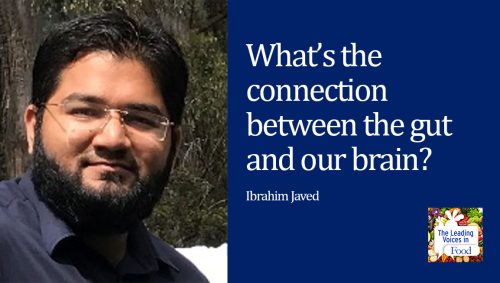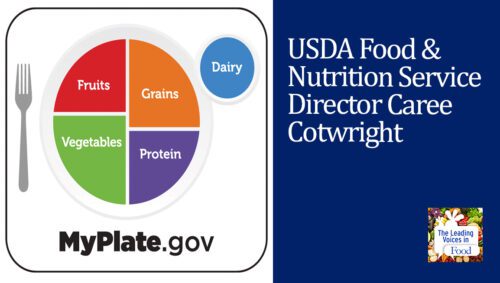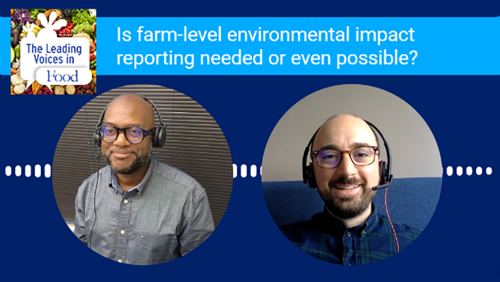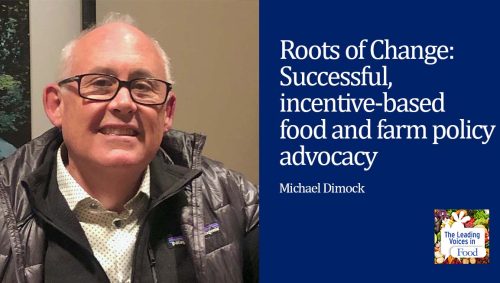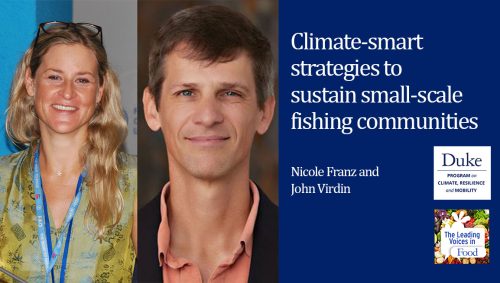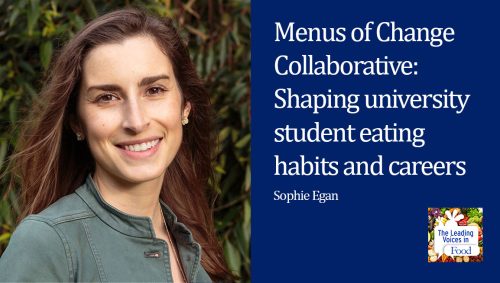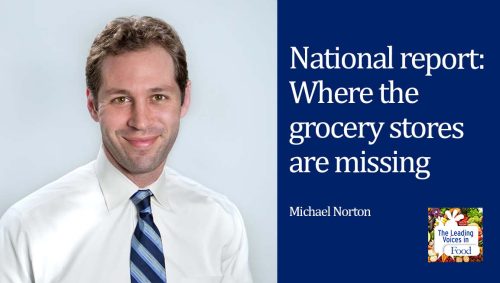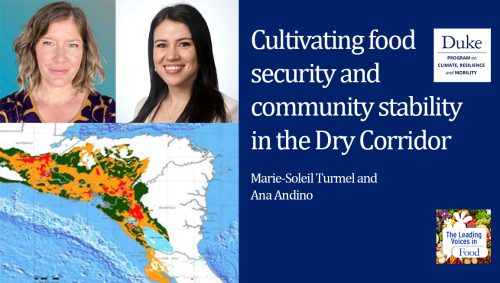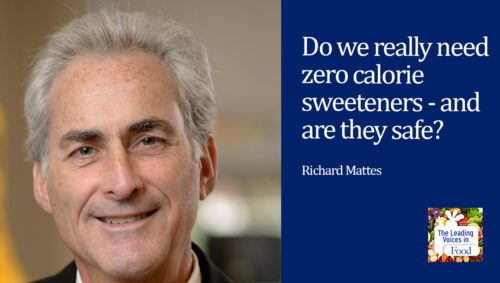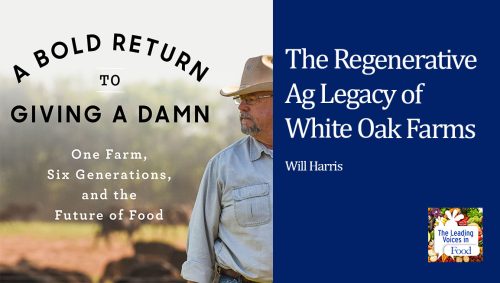The Leading Voices in Food
E27: William Dietz on Obesity, Undernutrition & Climate Change
It would seem at first glance that undernutrition and obesity are opposite sides of the same coin and not very related to one another and that neither of these issues would be related at all to climate change. Well, this turns out to not be true at all according to an authoritative new report for our listeners. The title of the report is The Global Syndemic of Obesity, Undernutrition and Climate Change, The Lancet Commission Report. One of the architects of that report is Dr. William Dietz.
Subscribe: Apple Podcasts | TuneIN | Google Podcasts | SoundCloud | PocketCasts | Radio Public
Tags: Child Development & Nutrition | Childhood Obesity | Climate Change, Environment & Food | Diet & Nutrition | Equity, Race & Food Justice | Food Insecurity | International Food & Ag Policy | Obesity | Regenerative Agriculture |

William Dietz is the director of the Sumner Redstone Global Center for Prevention and Wellness at the Milken Institute School of Public Health at George Washington University. Before joining the faculty of George Washington, he directed the Division of Nutrition, Physical Activity, and Obesity at the US Centers for Disease Control and Prevention. Dietz is a member of the National Academy of Medicine.
Interview Summary
You co-chaired the Lancet Commission that produced the report just mentioned, with Boyd Swinburn in New Zealand, and worked with leading experts from all around the world. The title of the report has the word syndemic in it. Can you describe what a syndemic is?
We thought a syndemic was a relatively new concept that was published in the Lancet in 2017. But when we went back, this concept really originated with a woman named Singer, who was in Connecticut, and in 1992 used it to describe the interaction of poverty and health. And then it went into this quiescent phase until it reemerged in these Lancet articles. And a syndemic is a combination of the word syndemic and epidemic and reflects the co-occurrence in time and place of two or more factors which have social determinants, such as economic factors or social factors or environmental factors. And we applied this to the pandemics of obesity, undernutrition, and climate change. And we named climate change a pandemic because of its breadth of impact and how widespread it was. And like the other syndemics which were limited mainly to diseases so that, for example, the interaction of HIV, intravenous drug use, hepatitis C and hepatocellular cancer–these epidemics, these pandemics also interact.
So for example, in particularly in middle-income countries, there is a co-occurrence of obesity and undernutrition in the form of stunting. Meat production causes obesity, colorectal cancer, and cardiovascular disease, and also generates a lot of greenhouse gases. In fact, agriculture generates almost 30 percent of greenhouse gases and cattle production generates about over half of that. Another example of the interaction is between car use, inactivity and obesity. So car use displaces physical activity, therefore increases the likelihood of obesity, generates greenhouse gases, which then in turn promote undernutrition by virtue of the catastrophic effects of excess greenhouse gases on low and middle income countries in terms of drought or even in terms of changing the nutrient composition of foods as global warming projects and moves forward. So we see these three pandemics as huge challenges and ones which are the paramount challenges for the 21st Century.
The Lancet report discusses using a systems approach to understanding and addressing these problems. What is a systems approach and, what systems in particular or do you think will be influential in changing the intersection of these things?
Well, as so I indicated from these examples of interactions, they’re really systems that underpin undernutrition, obesity and climate change. And the most prominent systems are the agricultural system, the urban design, and land use and transport systems. But even more profound than those systems are the underlying drivers of those systems. So the question becomes why did these systems operate the way they do? Well, they operate the way they do because we’ve designed them that way. The reason that we are car use dependent is not only because cars are heavily promoted by business and particularly on television, but car use is sustained by community design, which is not designed for public transport. It’s designed for car use. And promoted by the lack of taxes on gasoline or the low taxes which haven’t been increased in years. So we’re not paying the real costs of transport, and we’re not paying the real costs of beef production, for example.
The same thing applies to meat production. So, subsidies for forage crops support beef production and keep the prices artificially low. And we don’t pay, then, for the greenhouse gas emissions by cattle. We don’t pay for the environmental degradation caused by concentrated animal feedlots. If we were to pay the actual costs of transport or the true costs of food production, I think we would see substantial shifts in the consumption of our use, for example, our meat consumption. And this systems approach allows us to begin to point out what we’ve called double and triple duty actions. That is strategies which affect two or more of these pandemics. So increasing the gas price is one of those triple duty actions. Reducing meat consumption is one of those triple duty actions, which affects not only obesity but also climate change and undernutrition.
You’re making a pretty radical that people pay the actual cost of these things. So for example, if you go to the store and buy a hamburger or a steak, the prices could go way up, couldn’t it? If you’re paying for the health consequences that these products produce in society and the environmental consequences, do you have any reason to believe that the public would accept such a thing? Or the politicians would even propose it?
Well, that’s a good question. But we talk in the report about policy inertia, which is a term we coined to reflect the lack of movement on any of these issues, despite widespread recommendations that changes occur. And policy Inertia, as you correctly point out, is a consequence of lack of political will, lack of public demand, and industry opposition. So there’s good evidence of industry opposition. The most recent of which was to the dietary guidelines committee report and that most recently appeared and while the dietary guidelines expert committee recommended movement towards a plant-based diet, this was met with substantial opposition by the meat industry and the national cattleman’s association. I think there’s a national meat institute and one other organization which indicates the kind of resistance to these types of changes. Even though these changes would improve both public health and the environment.
So the bottom line here is I don’t think we can expect the government to act unless we begin to change things at the local level. I really have come to believe that if this is going to happen, it’s going to happen because people change their behaviors and begin to push governments to change their policies. And I think we can point to things that are already happening. Moving in that direction. Meatless Monday is one of those examples. We know that the growth of products which are produced sustainably is increasing at about five percent a year. That’s huge. We know that businesses that are selling healthier for you, or better for you products, are seeing more rapid increases in the sales of those products than in their traditional product lines. We also know that those cities, despite the US withdrawal from the Paris accords regarding climate change, that some US cities have persisted in trying to reduce their carbon footprint. And these trends are underway, whether they’re going to be powerful enough or operate quickly enough to reverse the global syndemic remains to be seen. But I’m worried because we don’t have very much time left. And these behaviors that are starting locally need to be amplified, and we need to be able to change the governance systems which underpin the systems that we have.
You mentioned that the US was out of step with the rest of the world on things like climate accord. And they’re just a lot of examples of this kind of thing. In the US, business interests are prevailing over public health interests more than in other countries. One has to wonder whether there’s any hope of reversing that. And you mentioned some local actions might eventually percolate up and affect the national government. Are there precedents for this that you’ve seen in other areas that might make you optimistic?
Well, I’m optimistic about the ability of people to change and governments to change. So take soda taxes. There are about seven or eight cities now or municipalities which have implemented soda taxes. And internationally, there’s actually more progress around soda taxes than there is in the United States. There are almost 30 countries which have implemented soda taxes. Mexico is a really good example. And what happened in Mexico was that civil society, the consumer groups, really went to bat for the soda tax despite very substantial opposition, which is why in our report, one of our recommendations is a call for investment of a $1,000,000,000 fund that can be used to support civil society actions in about 100 different countries. The other thing that we call for, which I think is implicit on what I mentioned just a few minutes ago, is that a summit of businesses who are operating based on principles for the 21st Century. And those principles are matching profit with the health of the community and health of the planet. And the corporations that have begun to do that I think are much more likely to succeed. And a summit which calls together businesses designed for the 21st Century, I think would be very instructive and could perhaps create models that would spread.
Do you see the world of philanthropy and foundations as helping move these things forward?
Absolutely. For example, the Bloomberg Foundation was instrumental in working in Mexico and is now invested in some other Latin American countries. And, I think that innovation often starts, at least in the US with foundation support. Interestingly enough, we were not able to get foundation support for our initial work on the syndemic. One group, which was working on undernutrition, recognized the association of undernutrition with obesity but said we’re very interested in undernutrition, not obesity. One of the groups working on climate change recognized the effects of climate change on undernutrition but said we’re interested in climate change but not undernutrition. So hopefully the recognition that this global syndemic exists will also prompt foundation investments to do the necessary work around communication, convening, all of the kinds of things that our recommendations called for, including a framework convention on food systems analogous to the framework on tobacco control.
For our listeners, the title of the report that we’ve been speaking about is The global Syndemic of Obesity, Undernutrition and Climate Change, the Lancet Commission Report.


